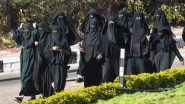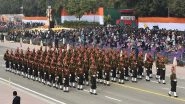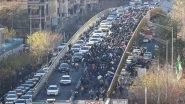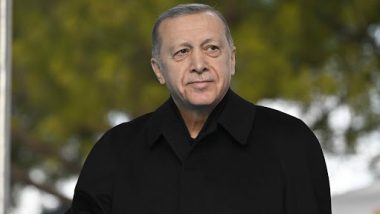Ankara, May 15: Conservative Turkish President Recep Tayyip Erdogan faces a runoff with his main rival in two weeks that will decide who leads a country struggling with sky-high inflation and hosting Syrian refugees as it plays a key role in the Middle East and in NATO expansion.
Election officials said on Monday that the May 28 second round will allow Turks to decide if their nation remains under the increasingly authoritarian president's firm grip for a third decade, or if it can embark on the more democratic course promised by Kemal Kilicdaroglu. The vote shows how Turkeyiye has become extremely polarised, some voters commented. “I am not happy at all," voter Suzan Devletsah said. "I worry about the future of Turkey.”
Erdogan faced electoral headwinds due to a cost-of-living crisis and criticism over the government's response to a devastating February earthquake. The nationalist's retreat was still less marked than predicted. But with his alliance retaining its hold on the parliament, he is now in a good position to win in the second round. Turkey Elections 2023: Counting Begins As Voting Concludes in Presidential, Parliamentary Polls.
“On May 28, God willing, if Tayyip Erdogan fulfills expectations, he will win,” Erdogan voter Engin Duran said. As in previous years, Erdogan led a highly divisive campaign. He portrayed Kilicdaroglu, who had received the backing of the country's pro-Kurdish party, of colluding with “terrorists” and of supporting what he called “deviant” LGBTQ rights.
In a bid to woo voters hit hard by inflation, he increased wages and pensions and subsidized electricity and gas bills, while showcasing Turkey's homegrown defense industry and infrastructure projects. Kilicdaroglu campaigned on promises to reverse crackdowns on free speech and other forms of democratic backsliding, as well as to repair an economy battered by high inflation and currency devaluation.
But as the results came in, it appeared those elements didn't shake up the electorate as expected. Turkiye's conservative heartland overwhelmingly voted for the ruling party, with Kilicdaroglu's main opposition winning most of the coastal provinces in the west and south. The pro-Kurdish Green Left Party, YSP, won the predominantly Kurdish provinces in the southeast.
The uncertainty drove the main Turkish stock exchange BIST-100 more than 6 per cent lower at the open Monday, prompting a temporary halt in trading. Though shares recovered briefly during the day, the index was back to the initial lows near closing time.
Western nations and foreign investors were particularly interested in the outcome because of Erdogan's unorthodox leadership of the economy and often mercurial but successful efforts to put the country that spans Europe and Asia at the center of many major diplomatic negotiations.
Preliminary results showed that Erdogan won 49.5 per cent of the vote on Sunday, while Kilicdaroglu grabbed 44.9 per cent, and the third candidate, Sinan Ogan, received 5.2 per cent, according to Ahmet Yener, the head of Supreme Electoral Board. The remaining uncounted votes were not enough to tip Erdogan into outright victory, even if they all broke for him, Yener said. In the last presidential election in 2018, Erdogan won in the first round, with more than 52 per cent of the vote. Turkey Elections 2023: Initial Results Show President Recep Tayyip Erdogan With Solid Lead.
Even as it became clear a runoff was likely, Erdogan, who has governed Turkey as either prime minister or president since 2003, painted Sunday's vote as a victory both for himself and the country.
“That the election results have not been finalized doesn't change the fact that the nation has chosen us,” Erdogan, 69, told supporters in the early hours of Monday. He said he would respect the nation's decision. Kilicdaroglu sounded hopeful, tweeting around the time the runoff was announced: “Do not fall into despair ... We will stand up and win this election together.”
Kilicdaroglu, 74, and his party have lost all previous presidential and parliamentary elections since he took leadership in 2010 but increased their votes this time. Right-wing candidate Ogan has not said whom he would endorse if the elections go to a second round.
He is believed to have received support from nationalist electors wanting change after two decades under Erdogan but unconvinced by the Kilicdaroglu-led six party alliance's ability to govern. The election results showed that the alliance led by Erdogan's ruling Justice and Development Party looked like it would keep its majority in the 600-seat parliament, although the assembly has lost much of its power after a referendum that gave the presidency additional legislative powers narrowly passed in 2017.
Erdogan's AKP and its allies secured 321 seats in the National Assembly, while the opposition won 213 and the 66 remaining went to a pro-Kurdish alliance, according to preliminary results. Howard Eissenstat, an associate professor of Middle East history and politics at St. Lawrence University in New York, said those results would likely give Erdogan an advantage in an eventual runoff because voters would not want a “divided government.”
Results reported by the state-run Anadolu Agency showed Erdogan's party dominating in the earthquake-hit region, winning 10 out of 11 provinces in an area that has traditionally supported the president. That was despite criticism of a slow response by his government to the 7.8-magnitude earthquake that killed more than 50,000 people.
Nearly 89 per cent of eligible voters in Turkey cast a ballot and over half of overseas voters went to the ballot box. Voter turnout in Turkey is traditionally strong, despite the government suppressing freedom of expression and assembly over the years and especially since a 2016 coup attempt.
Erdogan blamed the failed coup on followers of a former ally, cleric Fethullah Gulen, and initiated a large-scale crackdown on civil servants with alleged links to Gulen and also jailed activists, journalists and pro-Kurdish politicians.
"Turkish democracy is proving to be amazingly resilient. This election had a high turnout and offered a real choice," Frank Schwabe who headed a delegation from the Council of Europe to observe the elections. He added, however, that the country doesn't fulfill “the basic principles for holding a democratic election.” Turkey Elections 2023: Recep Tayyip Erdogan's Two-Decade Rule May End As Polls Show President Trailing Behind Opposition Candidate Kemal Kilicdaroglu.
Michael Georg Link, Special Co-ordinator and leader of the OSCE observer mission monitoring the election, said the elections were competitive but limited.
“As the criminalisation of some political forces, including the detention of several opposition politicians, prevented full political pluralism and impeded individuals' rights to run in the elections,” he explained.
(The above story is verified and authored by Press Trust of India (PTI) staff. PTI, India’s premier news agency, employs more than 400 journalists and 500 stringers to cover almost every district and small town in India.. The views appearing in the above post do not reflect the opinions of LatestLY)













 Quickly
Quickly


